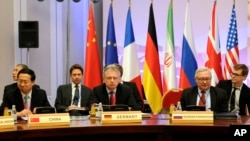Iran and world powers have agreed to further talks about the country's nuclear program, after two days of "positive" negotiations that yielded no major breakthroughs.
Iran's top negotiator Saeed Jalili said after Wednesday's meeting in Almaty, Kazakhstan, that the latest proposals by the so-called P5+1 group of nations are "more realistic" than past efforts.
The group - the United States, Britain, France, Russia, China and Germany - used the latest discussions to offer Iran sanctions relief, if it agrees to halt some of its nuclear enrichment activity.
European Union foreign policy chief Catherine Ashton says the group hopes Iranian negotiators are "looking positively" on the new proposal.
"The offer addresses international concerns on the exclusively peaceful nature of the Iranian nuclear program, but is also responsive to Iranian ideas," she said.
She says the plan is designed to "build some confidence" and enable to two sides to move forward.
The parties plan to hold expert-level talks next month in Istanbul, Turkey, followed by another round of meetings between top negotiators in Almaty in early April.
London correspondent for VOA Persian, Bijan Farhoodi, is in Kazakhstan and says the group is very much concerned about Iran's 20 percent uranium enrichment, which makes Tehran closer to reaching the uranium grade fit for making a nuclear weapon.
"So, what they want is Iran to stop its 20 percent production of uranium and to close the Fordo enrichment plant near Qom and send out whatever reserve of 20 percent that they have outside Iran," he said.
Farhoodi says that Iranian officials are preparing several counter-offers and will produce the one they consider commensurate to the benefits offered by the other nations. But he adds, the upcoming Iranian elections may affect the deal.
“It seems that everything is now dependent on the Iranian presidential elections, so what they care for is what’s going to happen in the election. And, some sources say that [chief negotiator Saeed] Jalili is not willing to make any deal, any substantial deal before the elections, that he doesn't want to be seen as a weak negotiator," he said.
U.S. Secretary of State John Kerry is urging Iran to move towards a diplomatic solution. Kerry met Tuesday with his German counterpart in Berlin and "expressed hope" that "Iran itself will make its choice to move down the path of a diplomatic solution."
The International Atomic Energy Agency recently said that Iran has begun installing a new generation of centrifuges at its Natanz enrichment plant, a move U.S. officials have deemed "provocative."
In the past few years, the United Nations Security Council has imposed sanctions on Iran in an effort to pressure it to curb its enrichment program. Several other countries, including the United States, have imposed additional measures.
The United States and other world powers suspect Iran is using its nuclear program to develop nuclear weapons. Iran says its program has peaceful aims.
Some information for this report was provided by AP, AFP and Reuters.
Iran's top negotiator Saeed Jalili said after Wednesday's meeting in Almaty, Kazakhstan, that the latest proposals by the so-called P5+1 group of nations are "more realistic" than past efforts.
The group - the United States, Britain, France, Russia, China and Germany - used the latest discussions to offer Iran sanctions relief, if it agrees to halt some of its nuclear enrichment activity.
European Union foreign policy chief Catherine Ashton says the group hopes Iranian negotiators are "looking positively" on the new proposal.
"The offer addresses international concerns on the exclusively peaceful nature of the Iranian nuclear program, but is also responsive to Iranian ideas," she said.
She says the plan is designed to "build some confidence" and enable to two sides to move forward.
The parties plan to hold expert-level talks next month in Istanbul, Turkey, followed by another round of meetings between top negotiators in Almaty in early April.
London correspondent for VOA Persian, Bijan Farhoodi, is in Kazakhstan and says the group is very much concerned about Iran's 20 percent uranium enrichment, which makes Tehran closer to reaching the uranium grade fit for making a nuclear weapon.
"So, what they want is Iran to stop its 20 percent production of uranium and to close the Fordo enrichment plant near Qom and send out whatever reserve of 20 percent that they have outside Iran," he said.
Farhoodi says that Iranian officials are preparing several counter-offers and will produce the one they consider commensurate to the benefits offered by the other nations. But he adds, the upcoming Iranian elections may affect the deal.
“It seems that everything is now dependent on the Iranian presidential elections, so what they care for is what’s going to happen in the election. And, some sources say that [chief negotiator Saeed] Jalili is not willing to make any deal, any substantial deal before the elections, that he doesn't want to be seen as a weak negotiator," he said.
U.S. Secretary of State John Kerry is urging Iran to move towards a diplomatic solution. Kerry met Tuesday with his German counterpart in Berlin and "expressed hope" that "Iran itself will make its choice to move down the path of a diplomatic solution."
The International Atomic Energy Agency recently said that Iran has begun installing a new generation of centrifuges at its Natanz enrichment plant, a move U.S. officials have deemed "provocative."
In the past few years, the United Nations Security Council has imposed sanctions on Iran in an effort to pressure it to curb its enrichment program. Several other countries, including the United States, have imposed additional measures.
The United States and other world powers suspect Iran is using its nuclear program to develop nuclear weapons. Iran says its program has peaceful aims.
Some information for this report was provided by AP, AFP and Reuters.










